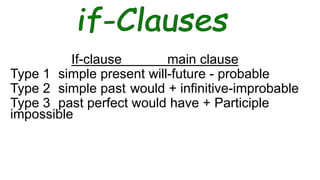Apresentação if clauses.pptx
- 1. If-clause main clause Type 1 simple present will-future - probable Type 2 simple past would + infinitive-improbable Type 3 past perfect would have + Participle impossible
- 2. Decide which type of if-clauses it is. 1. If you are not there, weâll wait outside the cafĂ©. ïš 2. We would go on holiday if we had enough money. ïš 3. W will see you at Anneâs party if we go. ïš 4. If you had practice more, you would have done better. ïš 5. If Mr Moore was friendly, he would get more
- 3. 7. Columbus said, âIf we sail to the West, we will find land.â ïš 8. If Iâm there first, Iâll get a table near the band. ïš
- 4. Exercise if-clauses type 1 1. If the weather ____ (be) good, we __________ (go camping) at the weekend. 2. If I _____ (get) a holiday job, I __________ (earn) some money. 3. The Indians said, âWe __________ nothing to eat if you _____ (kill all the buffaloes.â Exercise if-clauses type 2 4. If the taxi driver ________ (drive) faster, we __________ (arrive) at the station on time. 5. At lot of pupils __________ (do) better at school if they ________ (listen) to the teacher. 6. If the settlers ________ (try) to understand the Indians, they __________ (live) together peacefully.
- 5. Exercise if-clauses type 3 7. Iâm sure that Mr Turner ________ _______ ((give) Brian a job if he ___________ (be) more polite to him. 8. If the white settlers __________ (keep) their promises, the Indians _______________ (leave) them alone. 9. We _______________ (win) the match if we _______________ (practice) harder,





